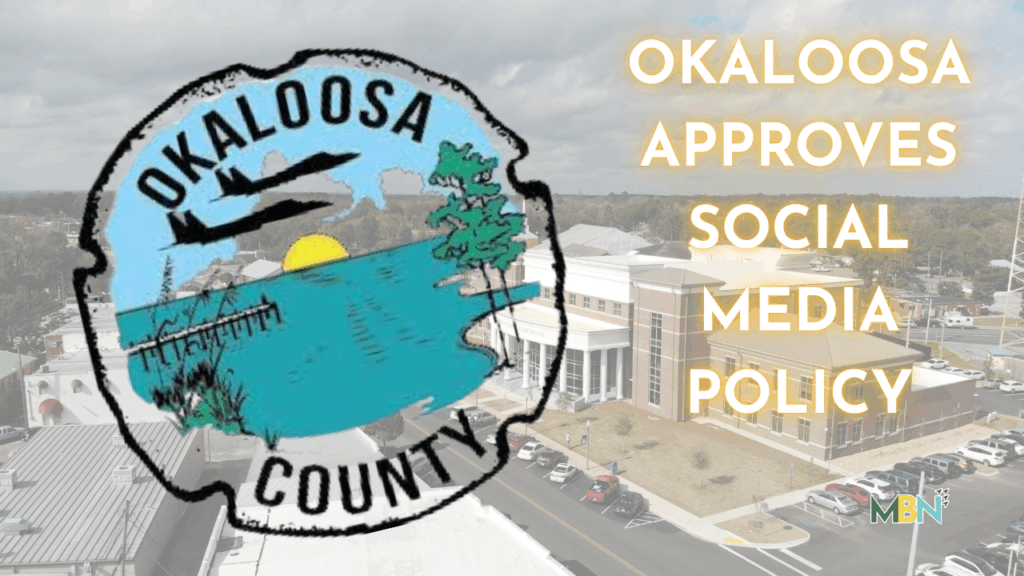
📘 New social media policy gives Okaloosa County employees clear guidance on both official and personal use of digital platforms.
🛑 Policy restricts unauthorized use of county branding while still allowing casual work-related posts.
🔄 Commission directed staff to draft implementation guidance and collect employee feedback for potential future revisions.
CRESTVIEW — The Okaloosa County Commission has unanimously approved a comprehensive new social media policy designed to provide guidance for county employees and protect the county’s branding, while also navigating constitutional free speech concerns and evolving state law.
The resolution, passed Tuesday, comes after more than a year of development and legal vetting. The policy sets out outlines for official and personal social media use by county employees, agents, volunteers and contractors, as well as providing a framework for managing public interaction on county-run platforms.
“This policy addresses content regulation, user conduct, handling of public feedback, compliance with state and federal laws, as well as … trends in recent case law,” said County Attorney Lynn Hoshihara, who authored the policy and presented it to the board.
A key element of the policy is Subsection H, which restricts the use of the county’s name, contact information, and logos on personal social media pages. However, a necessary clarification was added just before the vote.
“This is not intended to prohibit reflections of county employees’ work life, which may capture a county logo while wearing a county-issued uniform, or standing near a county vehicle or building,” Hoshihara explained. “The prohibition was intended to prevent anyone from creating social media sites that could be perceived … like a county site.”
Commissioner Trey Goodwin supported the policy but suggested a future review to prevent employees from unintentionally appearing to speak on behalf of the county.
“You have a right to be proud for what you do … but not to use it as a pretext to make it look like the county’s adopting a position that it hasn’t,” Goodwin said. “Maybe it’s worth kind of chewing on it … finding a way to make sure that even though we’re allowing that opportunity, that we have some guardrails.”
To address those concerns, Hoshihara noted that the policy already requires a conspicuous disclaimer when employees post in uniform, stating that views expressed do not represent those of the county. Additional language prohibits harassment, defamation, and any behavior inconsistent with county policies.
Commissioner Sherri Cox recommended that the Public Information Office (PIO) develop more straightforward guidelines for when use of county branding is permissible—even on personal accounts.
“I worry more about our brand as a county and how we can collect those dollars … when we go to ask the state for money and stuff like that,” Cox said. “I would like to see some more … specific advice as to when they can and cannot use the brand.”
Chairman Paul Mixon urged caution, warning that too-strict rules could have unintended consequences.
“All we’re doing is encouraging ghost profiles,” Mixon said. “If we put the parameters very stringent upon employees, then we’re just saying, go create a fake name and say whatever you want to.”
Public Information Officer Nick Tomichek said the policy strikes an appropriate balance and leaves room for improvement.
“It gives us some guidelines … and keeps an open conversation with the public,” Tomichek said. “We could take it on a case-by-case basis until the Commission decides that we need to refine this particular policy.”
Commissioner Drew Palmer recommended adding an implementation guide for employees and collecting feedback before revising the policy further.
“Here’s what the policy is, here’s how we envision it, and then we can receive employee feedback,” Palmer said. “And if we need to tighten up the policy later on, I think that would be a good way to do that.”
Following his suggestion, Goodwin amended his original motion to delegate staff to develop implementing guidelines that clarify formally, but do not expand, the policy.
The motion passed without opposition.
Register or login with Mid Bay News and never get another pop up on our site!